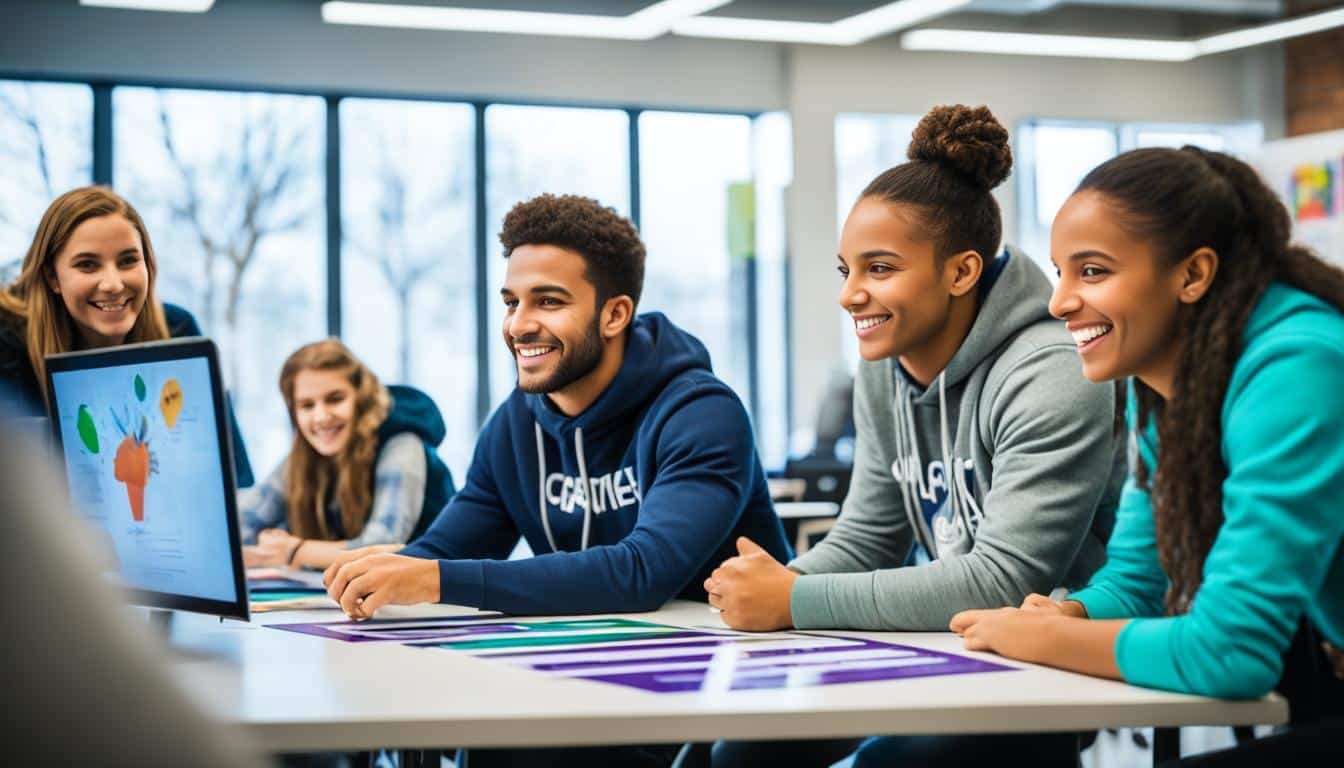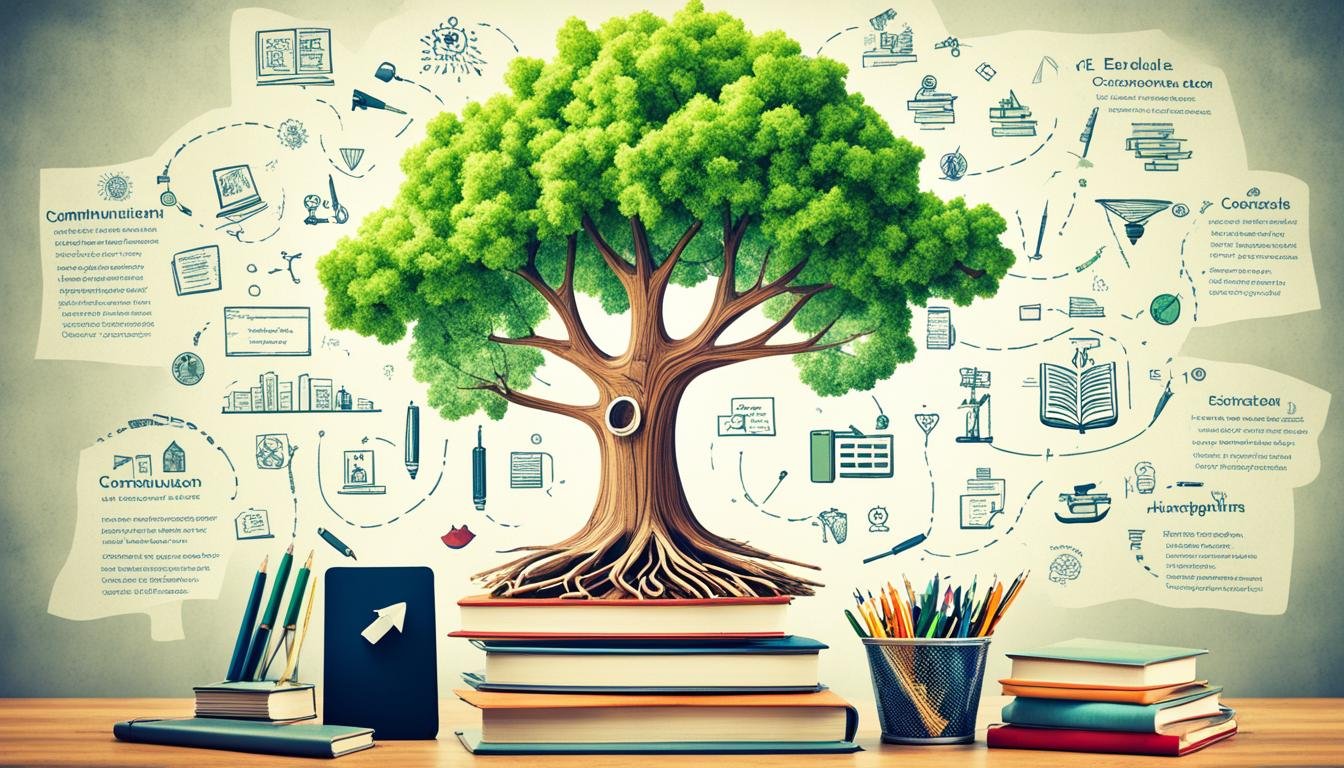The U.S. Department of Education wants all students to thrive in school and life. Its mission is to ensure a high-quality education for everyone. The call to action is “Raise the Bar: Lead the World.”
This calls for transforming the way we educate and working together. The Department focuses on helping states, districts, and schools improve. It aims to increase global engagement, make college more affordable, and boost achievement.
Also Read: What Are The Different Types Of Education Program Available?
Key Takeaways
- Expanding education opportunities is a key priority for the U.S. Department of Education
- The Department is committed to advancing educational equity and excellence through innovative strategies
- Efforts are focused on improving academic achievement, learning conditions, global engagement, and college access
- Providing tools, resources, and assistance to states, districts, and schools is a core component of the Department’s approach
- Transforming the education system to better serve all students is the ultimate goal
What is Quality Education?
Quality education is about more than just good test scores or learning facts. It’s a way to help students grow and succeed in a changing world. It focuses on building students who have a strong base of knowledge, can think critically, work with others, and care about the community.
Also Read: What Is Educational Technology And How Does It Enhance Learning?
Strong Foundational Knowledge
A good education starts with a solid base in subjects like math, science, and language. This knowledge is the foundation for learning more throughout life. With a well-rounded education, students understand these subjects deeply.
Also Read: What Are The Different Types Of Education System Around The World?
Critical Thinking and Problem-Solving
Good education teaches students not just what to think but how to think. It encourages looking at data, understanding problems, and coming up with creative fixes. This way, students learn to face challenges, change, and add new ideas to their world.
Also Read: What Are The Career Opportunities For Graduates With An Education Degree Online?
Collaboration
Learning to work as a team is vital in a quality education. Students practice communicating and using different viewpoints to meet goals. These skills are key for jobs and for dealing with a world that’s more connected than ever.
Also Read: How Do Cognitive Theories Explain Learning Processes In Educational Psychology?
Fostering Social Well-being
Education isn’t only about books; it’s also about emotions and relationships. A good education supports mental health, self-worth, and caring for others. This way, students learn to be strong both personally and socially.
Continuous Education
A quality education also teaches the joy of learning that lasts a lifetime. It gives students the tools to keep growing and adapting to what’s new. This way, they’re ready for whatever the future brings.
Beneficial Impact
Good education changes lives, communities, and the world. It creates people who are ready for anything, want to help, and can make a difference. This way, quality education helps everyone be their best and do good things.
The Importance of Quality Education
Quality education is incredibly important. It acts as a powerful tool that helps people grow and builds up towns. It also fuels the economy. By teaching critical thinking, knowledge, and how to be involved in society, it opens many doors.
Empowering Individuals
Quality education helps people reach their full potential. It gives them the skills and confidence to face today’s challenges. This leads to success and satisfaction in life. It’s all about making the most of what you know.
Stronger Communities
When people get a good education, it’s not just good for them. It makes whole communities better. Educated folks tend to work together, supporting their neighbors. They help create a place where everyone can thrive.
Economic Engine
Education is key for a healthy society and a strong economy. It gears people up for the jobs of the future. As more people bring new ideas and skills to work, the economy grows. This growth helps everyone do better.
Social Justice
Everyone should have a chance at a good education. It helps fight poverty and gives all a fair shot at success. By offering equal chances to learn, we make our society more fair for everyone.
Lifelong Learning
Education makes you love learning for life. It always teaches you how to learn new things. Being ready to learn never stops helps you keep growing, both at work and in your personal life.
For these reasons, quality education is key. It changes lives, boosts communities, helps the economy, fights for fairness, and encourages lifelong learning. Investing in education makes our future better for us all.
How Can We Improve Our Education System?

Improving our schools is critical. It opens doors for everyone and shapes our future. We need to focus on key areas for real, long-term change in education.
First off is investing in teacher training and development. Giving teachers the tools to make lessons engaging helps students think critically. This prepares students for the real world.
Next, we should focus on critical thinking, not just remembering facts. Teaching kids to analyze and solve problems will make them ready for the modern world. It ensures they can handle complex issues.
Using technology to boost learning is also important. Digital tools personalize education, promote teamwork, and make teaching more effective.
It’s vital to care for students’ mental and emotional health. By meeting all their needs, we create spaces where they can grow fully. This leads to better results in school and their future life.
Also, working together with teachers, parents, and the community is key. This teamwork makes sure our schools meet everyone’s needs and keep up with what society needs.
Tackling these areas will really improve our education system, making it more innovative and impactful. This change will empower people and build stronger communities for a better tomorrow.
“Education is the most powerful weapon which you can use to change the world.”
– Nelson Mandela
How Can Quality Education Be Achieved?

Achieving quality education needs a detailed plan. We must provide equitable access to education and create a welcoming learning space. It’s also important to support teachers, use education technology, and always strive to do better.
Ensuring Equitable Access
To have a strong society, everyone should have a fair chance at education. We can do this by offering scholarships, building schools in remote areas, and making sure our education policies are inclusive. Taking away obstacles to learning can make education open to all students.
Fostering a Positive Learning Environment
A setting full of positivity and engagement is key to students doing well. It means giving schools what they need, focusing on students’ interests, and encouraging them to think creatively and work together. When we put students first, they learn to love learning forever.
Empowering Teachers
Helping teachers grow is critical to good education. Training and ongoing support can give teachers the tools to help students successfully. When we invest in teachers, they can really help their students grow academically and as people.
Strategic Use of Technology
Using technology smartly can make learning better. Whether it’s through programs that offer personal lessons or tools that support teamwork, tech can be a great learning aid. But we need to be careful how we use tech, making sure it’s used well to help students learn better.
Continuous Improvement
To keep up, we have to keep getting better at education. That means checking how well our programs work, listening to what people have to say, and making changes based on facts. By always wanting to learn more and do better, we keep our system fresh and ready for what the future brings.
Focusing on these key areas will help us make big changes in our education system. This will empower people, build strong communities, and lead us to a fairer and brighter tomorrow.
Benefits of Quality Education in Primary Schools
Good education in the early years is key for later academic success and well-being. Kids learn important skills and develop a love for learning. This time also helps them grow socially and emotionally and be creative thinkers.
Academic Preparation
High-quality primary school education prepares children well. They learn to read, write, and do math, forming a strong foundation. This helps them handle more complex subjects as they go on, setting them up for future success.
Lifelong Learning Habits
Learning at this stage isn’t just about facts; it’s about loving to learn. Schools encourage questioning, thinking critically, and exploring. This helps students learn on their own and be ready to learn throughout life.
Social and Emotional Development
Primary schools also focus on students’ emotions and social skills. Kids learn to communicate, work together, and solve problems. They grow emotionally and learn to do well in different groups.
Holistic Development
Good primary education helps children in all areas of life. It helps them physically, mentally, socially, and emotionally. This approach helps kids not just do well in school but grow into balanced individuals ready for the future.
By giving kids a strong start in education, we’re helping them succeed in life. They’ll be lifelong learners and happy, fulfilled people.
Education Opportunities: Empowering Individuals and Societies

Education is key to improving people’s lives and changing societies. It gives us the skills, knowledge, and confidence to face problems. It helps us work together, grow, and reach our full potential.
Education is vital for the economy. It helps prepare people for future jobs. This leads to economic growth and supports societies. It also supports fairness by giving everyone equal chances and encouraging people to be active citizens.
Personally, education helps us push through barriers. It makes us better at making choices and reaching our goals. We become confident and learn how to think clearly. This lets us take control of our lives and help our communities.
For society, education is an economic powerhouse. It gives us the tools to be innovative, productive, and flexible. This improves and grows our economy. It also makes sure everyone has a fair shot at success, helping to end poverty and create a fairer world.
Education also teaches us to care about others and our world. It grows empathy and understanding. People who get a good education are more likely to get involved in their communities and work on big world issues together.
To sum up, education changes lives and boosts economies. It makes society fairer and helps the world. By supporting and making education available to everyone, we can make a better future for all.
| Benefit of Quality Education | Impact on Individuals | Impact on Societies |
|---|---|---|
| Empowerment | Increased confidence, critical thinking, and agency | Stronger communities and active civic engagement |
| Economic Development | Acquisition of skills for the workforce | Fueling innovation, productivity, and prosperity |
| Social Mobility | Equal access to opportunities | Breaking the cycle of poverty and promoting equity |
| Global Citizenship | Cultivating empathy and cultural understanding | Contribution to sustainable solutions for global challenges |
“Education is the most powerful weapon which you can use to change the world.”
– Nelson Mandela
Key Focus Areas for Expanding Education Opportunities
The U.S. Department of Education works hard to give every student a chance at a good education. They help by providing tools, resources, and support to schools, districts, and states. The main goals are to make sure students do well, improve learning settings, connect with the world, and make college more affordable and easier to finish.
Achieve Academic Excellence
The Department of Education wants to speed up learning and offer a strong education that prepares students for the future. They help schools and districts make sure every student gets the skills and knowledge they need to shine in the 21st century. This means focusing on strong basics, thinking and problem-solving skills, and being good at working with others.
Boldly Improve Learning Conditions
They understand that a supportive learning setting is key to students doing well. That’s why they are working hard to deal with the lack of teachers and look after students’ mental health. This work is all about creating a place where every student can grow and fulfill their potential.
Create Pathways for Global Engagement
In a world that’s more connected than ever, the Department wants to help students be ready to take on the world. They do this by getting students ready for college and careers, and by offering chances to learn multiple languages. This prepares students to do well in a global community.
Increase College Affordability and Completion
They see how important higher education is for changing lives. The Department focuses on making college easier to afford and helping more students finish. By making good education after high school available to everyone, they hope to open up new chances and help people achieve their dreams.
“Investing in quality education is not just about grades; it’s about giving people power, making communities stronger, and moving us forward socially and economically.”
Leveraging Technology for Education Opportunities
The digital world is changing fast. And using technology in education is more important than ever. It opens up our access to quality learning. This boost can make learning more personal, engage students, and give them more chances to practice.
But, tech shouldn’t replace teachers; it should help them. Mixing digital skills into learning is key. It prepares students for a world full of tech in the 21st century.
Empowering Personalized Learning
New learning tools let teachers meet students’ special needs and styles. They can use software that changes based on each student. And there are fun tools like digital games and VR that make lessons more exciting and hands-on.
Scaling Quality Instruction
Technology lets good teaching reach more students. Through online and mixed ways of learning, teachers can spread their knowledge wider. This also frees up time for teachers to give one-on-one help or work together more.
Fostering Digital Literacy
Tech skills are a must nowadays. Learning about coding, how to research online, and strong digital communication is key. These skills make students ready to handle whatever the future jobs may need.
As teaching methods keep changing, smart tech use will be essential. It will bring better learning to more people and get students ready for tomorrow’s world.
| Benefits of Education Technology | Challenges to Consider |
|---|---|
|
|
“Technology is just a tool. In terms of getting the kids working together and motivating them, the teacher is the most important.”
– Bill Gates
Building Stronger Parent-Teacher Relationships
Parents and teachers need to work closely. This partnership is key to a student’s success. By making families active in learning, keeping communication simple, and giving parents a clear role, schools can greatly help. The COVID-19 situation taught us how important parents are in teaching. Teachers saw parents as valuable partners too.
To work well together, parents and teachers should talk often and with respect. They should care about the student both academically and emotionally. Schools that welcome families and involve them create a strong support system. This helps students do better.
- Have regular chats with parents to talk about how the student is doing.
- Give parents tips and activities to help their child learn at home.
- Ask parents to help out at school or on trips, to show that families matter.
- Use tech to share info and work together easily.
Good parent-teacher relationships can make a big difference. They help make families part of their child’s learning. This can improve how students do in school and make learning better for everyone.
| Benefit | Description |
|---|---|
| Improved Student Performance | When parents and teachers join forces, kids usually do better in school, come more often, and like school more. |
| Enhanced Communication | Talking often helps solve problems, talk about good things, and make sure everyone helps support the student. |
| Increased Parental Involvement | Families that help with school are more invested in their kid’s learning. They join school things more often. |
| Strengthened School-Community Ties | With strong parent-teacher connections, everyone feels part of a community. They all care about each other’s education and well-being. |
“When parents and teachers team up, they change how kids experience school. “
By making parent-teacher relationships strong, schools get better family involvement. This means students do well and the community is stronger.
Embracing Improvement Science
In today’s constantly changing education world, it’s key to adopt improvement science principles. They help overhaul the education landscape and create more education opportunities. This method involves quick, ongoing assessments to validate, record, and expand on new ideas to enhance continuous improvement and education innovation.
Improvement science relies on up-to-date data, deep context understanding, and adjusting based on feedback. School leaders use this to swiftly test and bring in new, effective strategies. These can support schools and reach all students, especially those facing the most challenges.
This method focuses on moving forward, not on being perfect. It welcomes trying out new things in a safe environment. Educators can suggest new ideas, assess the outcome, and tweak them as necessary. The goal is to have a process of continuous improvement, learning with every step to make school better for students.
“Improvement science is not about perfection; rather, it’s about progress. It encourages a culture of experimentation, where educators are empowered to try new ideas, analyze the results, and make adjustments as needed.”
Adopting improvement science allows education systems to try, adjust, and enlarge upon new strategies tailored to their unique needs. This lively method enables educators to be quick, flexible, and persistent in seeking quality education for all students.
- Embrace a culture of experimentation and continuous improvement
- Utilize real-time data to make informed decisions and course corrections
- Empower educators to try new ideas and learn from their experiences
- Scale successful strategies that have a positive impact on student outcomes
- Remain adaptable and responsive to the evolving needs of the education landscape
Through embracing improvement science, innovating education leaders influence positive changes that broaden education opportunities for everyone. This lead to a better tomorrow for people and communities at large.
Conclusion
Due to the COVID-19 pandemic, our public education system needs a boost. We can enhance our schools by improving teaching methods, using technology smartly, and connecting parents and teachers better. We should also focus on making education fair and top-notch for all students. This way, we help our youth succeed in a fast-paced world.
Broadening education opportunities is key to changing lives and communities. Committing to education equity means every student gets a chance, no matter their starting point. With a shift towards education transformation, we can make schools more open and responsive to what our world needs.
There are hurdles ahead, but by teaming up and sharing the best methods, we can make our school system better and more ready for the future. This effort will shine as a light of hope and chances for the future. We should act now, as there’s a big chance to make things better.
FAQs
Q: What are the benefits of studying abroad?
A: Studying abroad offers students the opportunity to experience new cultures, enhance language skills, and gain a global perspective.
Q: How can I apply for a scholarship to expand my education opportunities?
A: To apply for scholarships, students should research available options, meet the eligibility criteria, and submit a strong application highlighting their academic achievements and potential.
Q: What role does New York University play in expanding educational opportunities?
A: New York University is a renowned institution that provides diverse educational opportunities for students through its various programs and initiatives.
Q: How can students from low-income backgrounds access higher education opportunities?
A: Students from low-income backgrounds can access higher education opportunities through financial aid programs, scholarships, and support services provided by colleges and universities.
Q: What are some common barriers faced by students seeking to expand their education opportunities?
A: Some common barriers include lack of financial resources, limited access to quality educational institutions, and systemic inequalities in the education system.
Q: How can young people advocate for better access to higher education?
A: Young people can advocate for better access to higher education by raising awareness about the importance of education, organizing community initiatives, and lobbying for policy changes.
Q: What are some strategies for navigating conflicts in educational settings?
A: Strategies for navigating conflicts in educational settings include effective communication, seeking mediation, and fostering a supportive and inclusive environment for all students.





